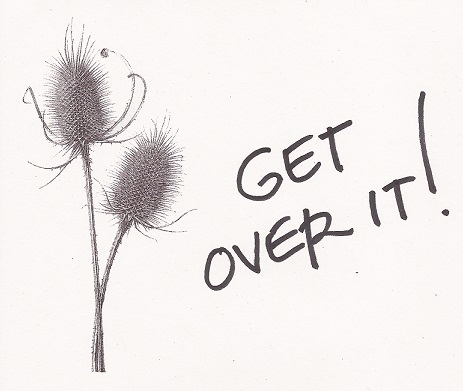 In the past few weeks, many of my clients have struggled with a “family pack” of negative emotions. For various reasons (all completely valid to the individual experiencing the emotion) they have felt disappointment, embarrassment, anguish, defeat, and anxiety. I’m happy to say that a few of these people have started to bounce back. Others are still struggling. One of them is stuck in a vat of negativity. It’s the disparity of coping mechanisms that led me to this week’s topic: how do we move past a major setback so that we don’t lose any ground or do any damage to our self-worth?
In the past few weeks, many of my clients have struggled with a “family pack” of negative emotions. For various reasons (all completely valid to the individual experiencing the emotion) they have felt disappointment, embarrassment, anguish, defeat, and anxiety. I’m happy to say that a few of these people have started to bounce back. Others are still struggling. One of them is stuck in a vat of negativity. It’s the disparity of coping mechanisms that led me to this week’s topic: how do we move past a major setback so that we don’t lose any ground or do any damage to our self-worth?
Here are a few ideas I would like to offer that are the result of my own personal experiences as well as my work with each of the individuals mentioned above.
Can you change your perspective? That was a rhetorical question. Of course you can. My client who was anguishing over losing out on seven job opportunities had told himself (after the seventh ding letter) that he was deeply flawed and clearly incapable of making a positive impression. I could hear the shift in his word choices, his tone of voice, and his energy level. We worked on what I call the “two-fer:” reflection and action. The reflection aspect has to do with opening up or shifting your perspective so that you can find new ways of thinking about the situation. In this particular case, after careful consideration and thoughtful discussion, one thing became crystal clear: four of those jobs should not have been on his list in the first place. This one realization helped him identify other explanations for why he did not get the job offers. This week he is feeling hopeful, which has helped him to stop the emotional flogging he was inflicting on his psyche. To paraphrase Steve Jobs, when you have more dots to connect, you can identify more alternatives.
Are you wallowing? Movement – both metaphorically and physically – is a great elixir. For example, the client who experienced acute anxiety found herself in that untenable state because she had no idea what her new boss expected from her, yet constantly sensed his dissatisfaction. Would anyone in their right mind want this dynamic to continue indefinitely? I’ll go out on a limb and say no. The problem was that she kept trying to read the tea leaves and the longer she waited the more she wallowed in the “poor me” mindset. She finally took the initiative to set up a meeting to ask him for specifics. He answered all her questions in detail and thanked her for her efforts to improve their relationship. Presto: air cleared.
Are all your “corrections forward?” In the world of horse racing, successful jockeys learn that every movement they make on the horse must create forward motion. If they do anything to cause even the slightest moment of hesitation, they will lose the race. Their mantra is “all corrections are forward.” The same is true for the rest of us. The #1 reason for not being able to move past a setback is allowing ourselves to get stuck in the reaction. I have a friend who experienced a significant setback on a Thursday. He now refers to the following Friday, Saturday and Sunday as the “lost weekend.” By Monday he began doing things that helped him move past the upset. In retrospect, he wishes he could have that weekend back. Distance brings objectivity, so why not start that process sooner?
Will it matter ten years from now? I believe Richard Carlson, author of Don’t Sweat the Small Stuff, popularized this sentiment. It’s a bit cliché, but it has merit. What aspects of the current setback will matter ten years from now? Is it simply a matter of ego-clinging that has you wrapped up in negative emotions? Can you write a new chapter that starts with a detailed description of the lessons you learned and how you will act accordingly from now on?
Holding onto negative feelings is damaging. The ancient philosophers learned that what the mind dwells upon, the body acts upon. Too much time is spent with a heavy weight on our shoulders. It’s just not good for the lower back!
– Barbara


